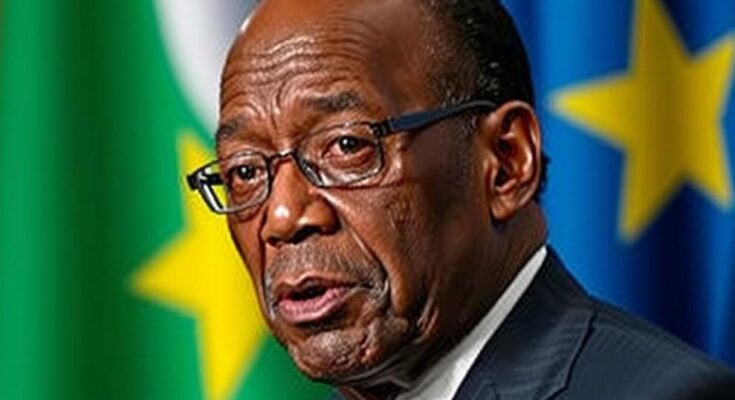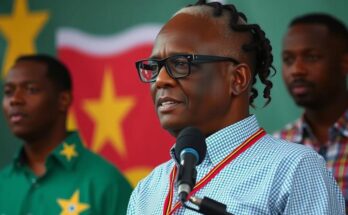Macky Sall, former president of Senegal, is making a controversial return to politics by leading an opposition coalition from Morocco, following his resignation amidst a political crisis earlier this year. His actions, contentious due to accusations from Prime Minister Ousmane Sonko about financial mismanagement and unrest during his tenure, question the stability of Senegal’s political environment. Analysts suggest Sall aims to protect his interests as tensions rise ahead of snap parliamentary elections.
Macky Sall, the former president of Senegal, is attempting a controversial political comeback by spearheading a newly formed opposition coalition from Morocco, following his resignation earlier this year after a lengthy tenure of twelve years. His departure from office was marked by a severe political crisis, which arose from his decision to postpone the presidential election. The current political landscape in Senegal reflects lingering tensions between Sall and his rival, Prime Minister Ousmane Sonko, who has accused the previous administration, particularly Sall, of detrimental financial mismanagement. As Sall seeks to reclaim influence in Senegal’s politics, concerns are raised regarding his motives and the implications of his return, particularly in light of accusations from Sonko suggesting potential legal repercussions for Sall and his administration.
Political analysts suggest that Sall’s re-entry into the political arena is driven by a desire to retain control amid fears of retribution against his former administration. Maurice Soudieck Dione, a political science educator, posited that Sall’s actions might stem from a quest to safeguard his interests in light of looming political repercussions. While his respected status internationally contrasts with the domestic chaos that characterized his later years in power, Sall’s premature approach towards re-engagement in Senegalese politics has diverged from typical behavior expected from former leaders in the country. As the forthcoming elections near, the electorate’s mixed response signaling a yearning for change complicates the prospects of Sall’s political aspirations.
Senegal’s political history has been marked by a relatively stable democratic process; however, recent events have highlighted the fragility of this stability. Macky Sall, who served as president for twelve years, left office amid significant unrest incited by his controversial decisions, namely the postponement of elections. The transition of power to Bassirou Diomaye Faye, coupled with accusations against Sall’s administration, has constructed a volatile political landscape wherein oppositional figures, especially Prime Minister Sonko, are gaining popularity by promising reform. The historical context of Senegalese politics, which traditionally discourages former leaders from re-entering the fray, combined with the recent crises, shapes the narrative of Sall’s attempt to return to prominence in the political sphere.
In summary, Macky Sall’s attempt to re-engage with Senegalese politics while residing abroad raises significant questions regarding his intentions and the broader implications for the political climate in Senegal. With Prime Minister Sonko criticizing Sall’s administration for past mismanagement and societal unrest still fresh in memory, the forthcoming elections will undoubtedly be critical in determining Senegal’s political future. As significant as Sall’s return may appear, the response of the Senegalese populace, particularly concerning forgiveness for past grievances, remains uncertain.
Original Source: www.arabnews.com



